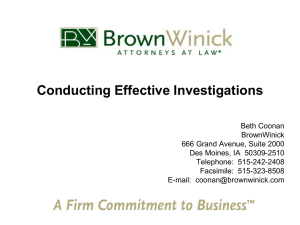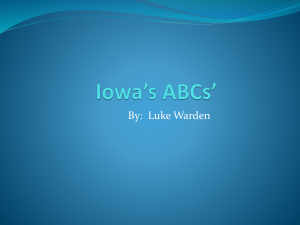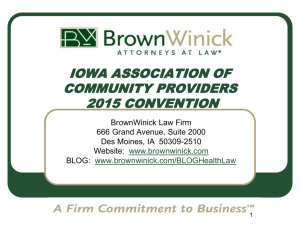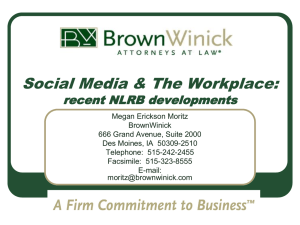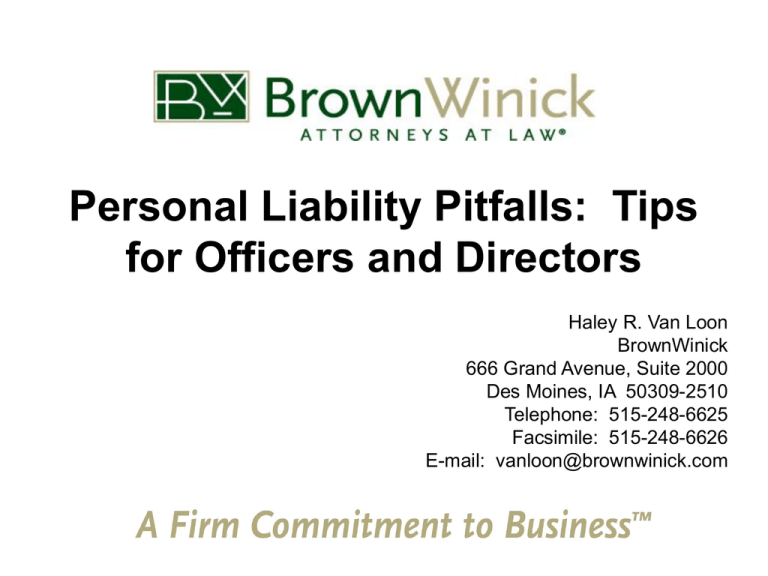
Personal Liability Pitfalls: Tips
for Officers and Directors
Haley R. Van Loon
BrownWinick
666 Grand Avenue, Suite 2000
Des Moines, IA 50309-2510
Telephone: 515-248-6625
Facsimile: 515-248-6626
E-mail: vanloon@brownwinick.com
Failure to Pay Wages on Time
Iowa Code Chapter 91A, the "Iowa Wage
Payment Collection Law" provides for
"employer" liability, but . . .
There have been numerous recent attempts
to pass "wage theft" legislation in the Iowa
legislature.
Wage Theft Legislation
•The proposed legislation would make it a crime for
undercapitalized businesses to "steal" wages through nonpayment; and
•This type of legislation has been aimed at both the employer,
and others "in charge," including supervisors, officers and
directors.
The final word . . .
Stay tuned, but be mindful that the non-payment of wages is
looked upon with disfavor and may be the subject of new
legislation.
Failure to Pay Minimum Wage
Fair Labor Standards Act of 1938 (FLSA)
The FLSA imposes certain minimum wage
and
overtime
requirements
upon
employers.
Under the FLSA, each
"employer" must pay a minimum wage. 29
U.S.C. § 206(a).
So who is the employer?
Any person acting directly or indirectly in the
interest of an employer in relation to an employee.
Any corporate agent who has economic control or
can exercise control over the nature and structure
of the employment relationship, based on the
circumstances and economic reality of the
relationship.
Thus, officers and directors (and possibly others)
may be assessed individual liability.
Failure to Provide Workers’
Compensation Insurance
"Employers" are required obtain workers'
compensation coverage before engaging in
business activities. Any person who "willfully
and knowingly" violates this requirement is
guilty of a class "D" felony.
In addition . . .
•A failure to provide workers' compensation insurance
means the Iowa Attorney General may be notified. Upon
notification, the Attorney General is required to bring an
action to stop further violation of the workers' compensation
law (Iowa Code § 87.19); and
•A failure to provide workers' compensation insurance will
eliminate the "gross negligence" standard applicable to
properly insured businesses. Thus, the injured employee
would simply need to show negligence in order to collect
damages from a fellow employee. Iowa Code § 87.21.
Failure to Withhold Taxes
State Liability
Employers and “withholding agents” are
required to withhold taxes and pay withheld
sums to the Department of Revenue
Who is a “withholding agent” under
Iowa law?
• Includes any officer or employee of a
corporation or association who has the
responsibility to withhold and pay taxes
and who knowingly fails to do so.
Failure to Withhold Taxes
Federal Liability
Employers are required to withhold federal
income and FICA taxes from an employee's
wages. Employers are also required to pay
these amounts to the IRS along with the
employer's share of FICA, as well as FUTA
taxes.
Officers, directors (and others “in
charge”) beware . . .
Any person "responsible" for the collection
and payment of these taxes who willfully
fails to pay over withheld taxes may be
personally liable for a penalty equal to 100%
of the delinquent trust fund taxes.
In
addition, criminal penalties are also a
possibility.
Failure to Abide by ERISA
The Employee Retirement Income Security
Act (ERISA) governs employee benefit
plans, like health insurance and 401(k)
plans. Officers and directors may have
personal liability if they have "discretionary
authority" or "responsibility" for the
administration of employee health and
401(k) plans.
Failure to Comply with the Iowa
Civil Rights Act
The Iowa Civil Rights Act prohibits various
forms of discrimination in employment,
including on the basis on age, race, creed,
color, sex, national origin, religion or
disability.
The Iowa Supreme Court has determined
that supervisory employees may be subject
to individual liability under the Iowa Civil
Rights Act.
The Possibility of Corporate Veil
Piercing
Because officers and directors are also
frequently shareholders of a corporation or
members of a limited liability company the
possibility of corporate veil piercing should
be considered.
Under Iowa law, owners can be personally liable if
“the corporation is a mere shell, serving no
legitimate business purpose, and used primarily as
an intermediary to perpetuate fraud or promote
injustice.”
Factors considered include:
•Undercapitalization;
•Failure to keep separate books;
•Failure to keep separate finances;
•Corporation used to promote fraud or illegality;
and
•Corporation is a mere sham.
Website: www.brownwinick.com
Toll Free Phone Number: 1-888-282-3515
OFFICE LOCATIONS:
666 Grand Avenue, Suite 2000
Des Moines, Iowa 50309-2510
Telephone: (515) 242-2400
Facsimile: (515) 283-0231
616 Franklin Place
Pella, Iowa 50219
Telephone: (641) 628-4513
Facsimile: (641) 628-8494
DISCLAIMER: No oral or written statement made by BrownWinick attorneys should
be interpreted by the recipient as suggesting a need to obtain legal counsel from
BrownWinick or any other firm, nor as suggesting a need to take legal action. Do not
attempt to solve individual problems upon the basis of general information provided
by any BrownWinick attorney, as slight changes in fact situations may cause a
material change in legal result.



